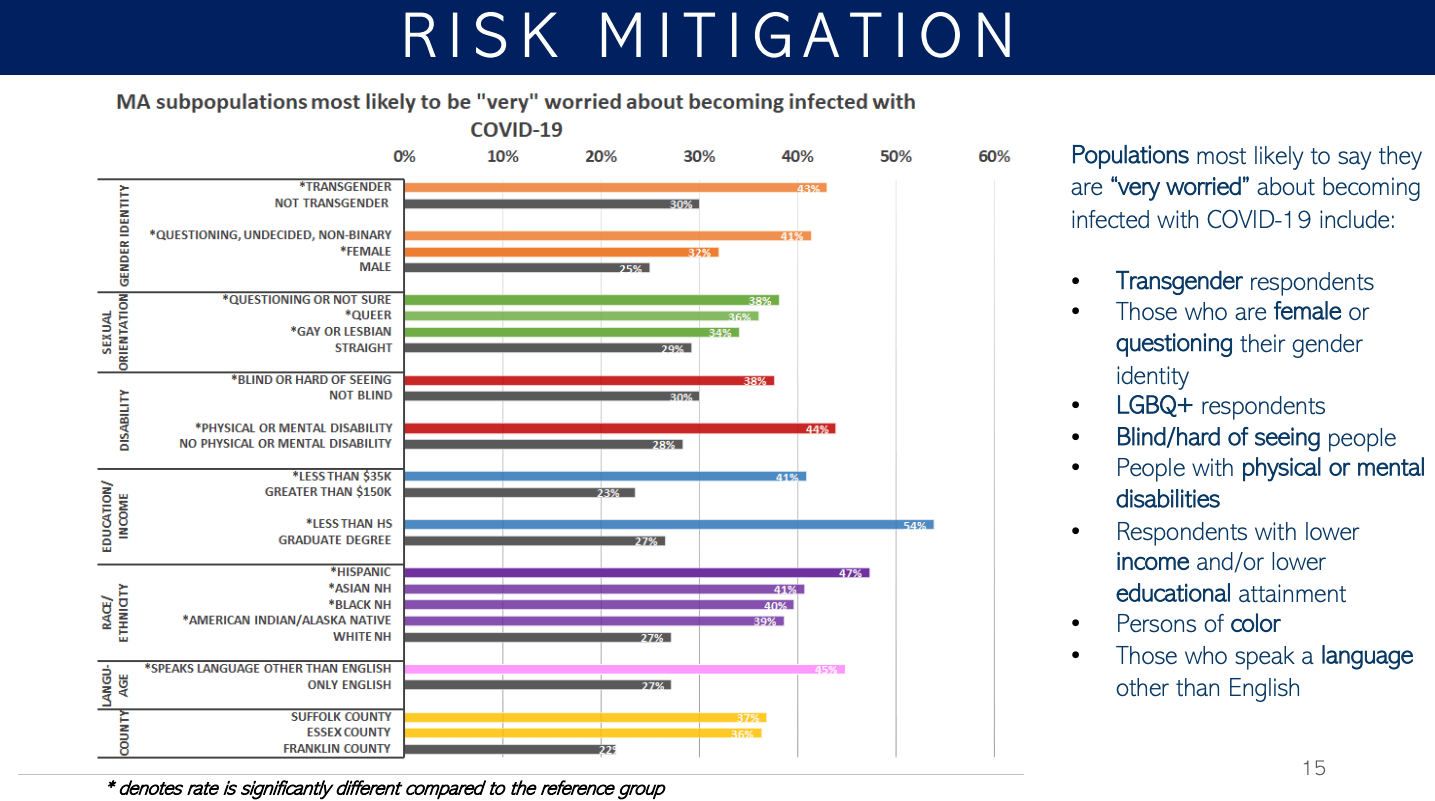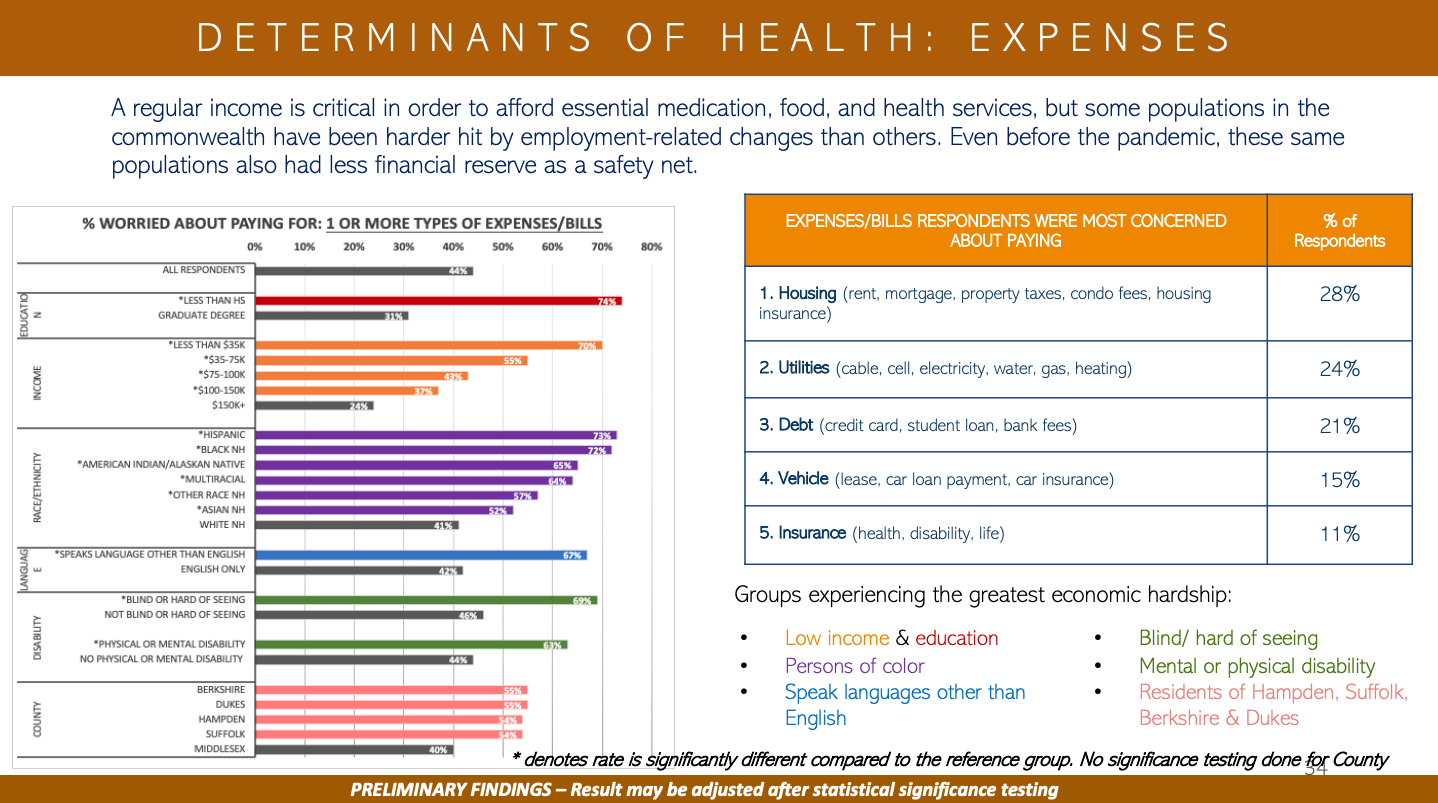Advertisement
Coronavirus Coverage
Mass. Survey Documents Disparate Impacts Of Pandemic For People Of Color, Low Income Residents
Public health experts have warned since virtually the beginning of the pandemic that the COVID-19 crisis wreaks more severe impacts on some populations such as communities of color and lower-income earners.
Now, those gaps in the pandemic experience have been highlighted in a state-run survey of more than 35,000 Massachusetts.
Groups including LGBTQ populations, people of color, lower-income households and those with disabilities often experienced more worry about COVID-19, less economic stability during the crisis, and greater rates of delayed medical care, according to data from the survey presented at a state Public Health Council meeting on Wednesday.

Residents who are unable to maintain social distancing of at least six feet, whether because their local stores are too crowded or because their work requires physical proximity, were more likely to be most concerned about contracting the highly infectious virus.
About 52% of statewide respondents polled between September and November said they continued to work outside their homes during the pandemic, and the Department of Public Health found those adults were more than twice as likely to test positive for COVID-19 than those who worked remotely.
In-person working rates were far higher than the state average among some population groups: 82% of workers with less than a high school degree reported working outside the home, as did 75% of those with a trade school or vocational education and 73% of employees with a high school diploma or GED.
Among industry groups listed in the DPH survey, grocery store and hotel accommodation employees had the highest rates of leaving home for work at 94% and 91%, respectively. Conversely, only 15% of college and university workers reported doing their jobs away from home.
The survey also found evidence that the COVID-fueled economic crisis is creating greater burdens on some communities.
For both Hispanic and Black populations, more than seven in 10 people surveyed expressed concern that they could not pay for at least one crucial expense or bill such as housing or utilities, compared to four in 10 among white respondents.

Residents of several ethnicities, particularly Salvadoran, Dominican, Colombian and Cape Verdean, were nearly or more than twice as likely as the statewide average to indicate worry about getting food or groceries in the coming weeks.
Women surveyed were twice as likely as males — 16% to 8% — to change their employment in the past year so they could care for children, fitting into a pattern that has drawn national attention.
Public Health Commissioner Monica Bharel said the extensive results — which also include data on health care access, mental health, testing, workplace distancing and more — would contribute to the Baker administration's efforts to make vaccines more available in the hardest-hit communities.
"These survey findings have informed our efforts and provided a data-driven foundation for our vaccine equity initiative," Bharel said. "We are laser-focused on ensuring equitable access to the COVID vaccine."
On Tuesday, DPH announced it would offer assistance to 20 historically underserved municipalities that have been significantly affected by COVID-19: Boston, Brockton, Chelsea, Everett, Fall River, Fitchburg, Framingham, Haverhill, Holyoke, Lawrence, Leominster, Lowell, Lynn, Malden, Methuen, New Bedford, Randolph, Revere, Springfield and Worcester.
The campaign, which officials also outlined at Wednesday's meeting, will establish community liaisons for each of the 20 cities and towns to connect local and state leaders on efforts to identify gaps and barriers to vaccine access, develop population-specific outreach materials, and potentially launch door-knocking campaigns to increase interest in the immunization.
Bharel also signed an order this month requiring vaccine providers to track demographic information, including race and ethnicity, for recipients of the doses, a step she said Wednesday will offer better insights into where officials need to expand outreach efforts.
Based on the survey results, DPH officials praised the state-run Stop the Spread testing campaign as a success. Populations that were targeted through that effort, such as residents of color and those in denser communities, reported higher rates of receiving tests.
Equity remains a concern for many activists and experts. A group of civil rights, public health and elected leaders on Wednesday launched a new "Vaccine Equity Now!" coalition, demanding the Baker administration direct additional funding and doses to communities of color.